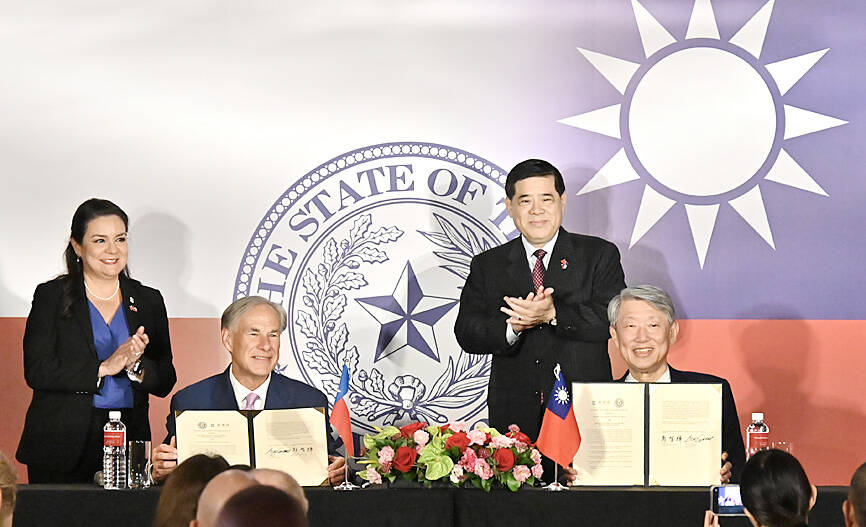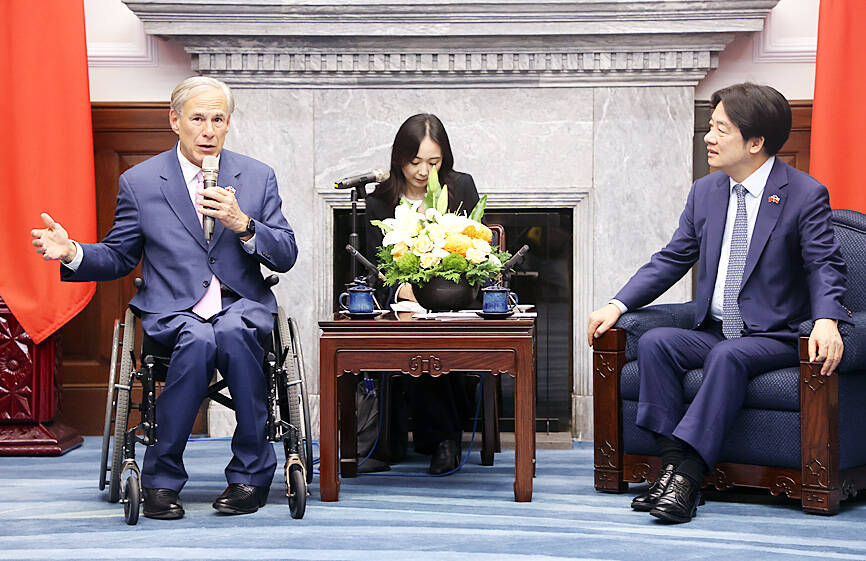Visiting Texas Governor Greg Abbott yesterday announced the opening of a state trade office in downtown Taipei to enhance cooperation and show that “Texas stands with Taiwan.”
The State of Texas Taiwan Office is the second foreign office Texas has opened in the 21st century after Mexico, Abbott told a news conference in Taipei.
“It shows that other than our geographic neighbor, Texas understands the importance of establishing an office in the country of Taiwan,” he said.

Photo: George Tsorng, Taipei Times
“It is incredibly important that Texas shows solidarity with Taiwan, not just for the businesses of Taiwan and Texas — it is important for the entire world to know Texas stands with Taiwan,” Abbott said.
“Because of the size of the Texas economy, it [the office] will be a beacon across the entire globe about a state and a country showing the importance of the relationship between Texas and Taiwan,” he said.
“Knowing that the stronger Taiwan is economically, the more it will be able to indefinitely chart its own future is very important for the future of the entire world,” he added.

Photo: CNA
Abbott made the announcement after signing an Economic Development Statement of Intent with Taiwan Minister of Economic Affairs Kuo Jyh-huei (郭智輝) to boost economic ties at the same event.
In a speech before signing the statement of intent, Kou said that under the deal, Taiwan would continue to expand trade and investment in Texas to help Taiwanese businesses establish a solid foothold overseas and boost supply chain resilience.
Abbott said the deal would further bolster economic bonds between Texas and Taiwan, expand trade and job creation and promote collaboration in semiconductors and energy resilience.
Earlier yesterday, Abbott met with President William Lai (賴清德) in the Presidential Office in Taipei.
Lai said that Abbott was one of the first US leaders to issue a congratulatory message to him after his presidential election victory in January.
Many Taiwanese enterprises have for decades invested in Texas, with total investment exceeding US$12 billion, Lai said.
His administration is promoting Taiwan’s five trusted industry sectors — semiconductors, artificial intelligence, the military, security and surveillance, and next-generation communications — which would result in closer links with industrial clusters in Texas, Lai said.
The Texas office is expected to become a firm pillar of friendship between Taiwan, Texas and the US, making the Taiwan-US partnership even stronger, Lai added.
Abbott’s economic development delegation arrived in Taiwan on Saturday.
The visit is part of a larger trip to the Indo-Pacific region that also includes South Korea and Japan, during which the governor would meet with “businesses and government leaders to drive forward progress in industries critical to the future of the global economy,” the state government said in a news release.
The delegation is scheduled to return to the US on Saturday.

CHAOS: Iranians took to the streets playing celebratory music after reports of Khamenei’s death on Saturday, while mourners also gathered in Tehran yesterday Iranian Supreme Leader Ayatollah Ali Khamenei was killed in a major attack on Iran launched by Israel and the US, throwing the future of the Islamic republic into doubt and raising the risk of regional instability. Iranian state television and the state-run IRNA news agency announced the 86-year-old’s death early yesterday. US President Donald Trump said it gave Iranians their “greatest chance” to “take back” their country. The announcements came after a joint US and Israeli aerial bombardment that targeted Iranian military and governmental sites. Trump said the “heavy and pinpoint bombing” would continue through the week or as long

TRUST: The KMT said it respected the US’ timing and considerations, and hoped it would continue to honor its commitments to helping Taiwan bolster its defenses and deterrence US President Donald Trump is delaying a multibillion-dollar arms sale to Taiwan to ensure his visit to Beijing is successful, a New York Times report said. The weapons sales package has stalled in the US Department of State, the report said, citing US officials it did not identify. The White House has told agencies not to push forward ahead of Trump’s meeting with Chinese President Xi Jinping (習近平), it said. The two last month held a phone call to discuss trade and geopolitical flashpoints ahead of the summit. Xi raised the Taiwan issue and urged the US to handle arms sales to

BIG SPENDERS: Foreign investors bought the most Taiwan equities since 2005, signaling confidence that an AI boom would continue to benefit chipmakers Taiwan Semiconductor Manufacturing Co’s (TSMC, 台積電) market capitalization swelled to US$2 trillion for the first time following a 4.25 percent rally in its American depositary receipts (ADR) overnight, putting the world’s biggest contract chipmaker sixth on the list of the world’s biggest companies by market capitalization, just behind Amazon.com Inc. The site CompaniesMarketcap.com ranked TSMC ahead of Saudi Aramco and Meta Platforms Inc. The Taiwanese company’s ADRs on Tuesday surged to US$385.75 on the New York Stock Exchange, as strong demand for artificial intelligence (AI) applications led to chip supply constraints and boost revenue growth to record-breaking levels. Each TSMC ADR represents

Pro-democracy media tycoon Jimmy Lai’s (黎智英) fraud conviction and prison sentence were yesterday overturned by a Hong Kong court, in a surprise legal decision that comes soon after Lai was jailed for 20 years on a separate national security charge. Judges Jeremy Poon (潘兆初), Anthea Pang (彭寶琴) and Derek Pang (彭偉昌) said in the judgement that they allowed the appeal from Lai, and another defendant in the case, to proceed, as a lower court judge had “erred.” “The Court of Appeal gave them leave to appeal against their conviction, allowed their appeals, quashed the convictions and set aside the sentences,” the judges